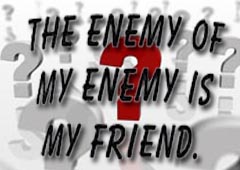The Obama administration’s decision to remove the Iranian cult Mujahedin-e Khalq (MEK) from the State Department’s list of officially designated terrorist groups was a long time coming. But  no single act by the administration so crystalizes the hypocrisy and recklessness of US postures towards Iran.
no single act by the administration so crystalizes the hypocrisy and recklessness of US postures towards Iran.
The MEK has a long history of terrorist activity going back to the 1970s and has the goal of overthrowing the Iranian government. Because of this goal, there has been a big money push by many influential people in Washington to get the group de-listed, presumably to make it eligible for US funding to act against the Iranian regime.
Please ignore the fact that these political elites that received payments from the MEK in order to advocate on their behalf appear to be in violation of laws prohibiting material support for “terrorists.” Also ignore the fact that George W. Bush included Saddam Hussein’s support for terrorists like MEK in his propaganda justifying the invasion of Iraq in 2003. “Iraq shelters terrorist groups including the Mujahedin-e-Khalq Organization,” reads a document in the archives of the White House’s website, “which has used terrorist violence against Iran and in the 1970s was responsible for killing several US military personnel and US civilians.” As recently as 2007, a State Department report warned that the MEK, retains “the capacity and will” to attack “Europe, the Middle East, the United States, Canada, and beyond.”
As Glenn Greenwald pointed out yesterday, whether the MEK is still an officially designated “terrorist” group has exactly zero to do with whether or not they carry out terrorism:
The history of the US list of designated terrorist organizations, and its close cousin list of state sponsors of terrorism, is simple: a country or group goes on the list when they use violence to impede US interests, and they are then taken off the list when they start to use exactly the same violence to advance US interests. The terrorist list is not a list of terrorists; it’s a list of states and groups which use their power to defy US dictates rather than adhere to them.
This was also exemplified earlier this month when the Obama administration decided to officially designate the Haqqani network a terrorist organization. The Haqqanis are a branch of the Taliban that launches attacks on occupying forces in Afghanistan. The Reagan administration funneled money and weapons to Islamic fighters in Afghanistan against the Soviets in 1980s. Back then, the Haqqani network were freedom fighters. Now the US says they’re officially terrorists.
And as Greenwald explains, “Saddam was put on it when he allied with the Soviets in the early 1980s, then was taken off when the US wanted to arm and fund him against Iran in the mid-1980s, then he was put back on in the early 1990s when the US wanted to attack him.”
Aside from the clear-as-day hypocrisy of this list, the decision to de-list MEK will have deleterious effects for US policy towards Iran. The Obama administration has stubbornly refused to reciprocate to Iranian concessions in the international negotiations over their nuclear program and has imposed harsh economic sanctions. The two things the administration had going for it was the fact that it was pretty clear to the world that they were blocking an immediate Israeli strike and also that negotiations are continuing, probably in an attempt to deal with it more freely after the US presidential elections. But now that the US has de-listed MEK and opened up the potential for more direct support of the group, which argues for the overthrow of the Iranian regime, how can the administration claim its policy is one of engagement and negotiations as opposed to subversion and aggression?
As Paul Pillar wrote yesterday:
The regime in Tehran will tacitly welcome this move (while publicly denouncing it) because it helps to discredit the political opposition in Iran—a fact not lost on members of the Green Movement, who want nothing to do with the MEK. The MEK certainly is not a credible vehicle for regime change in Iran because it has almost no public support there. Meanwhile, the Iranian regime will read the move as another indication that the United States intends only to use subversion and violence against it rather than reaching any deals with it.
So why de-list the MEK? The only credible answer is that the US aims to undermine the Iranian regime. And even though MEK has virtually zero support in Iran, and despite the embarrassing history the US has of aiding dissident groups in rival countries, Washington seems to view the MEK as instrumental in undermining Tehran. Furthermore, according to US officials, Israel has supported and is supporting the MEK to carry out terrorism in Iran and targeting Iranian nuclear scientists for assassination. Pillar says it might have been nice to mention this when the State Department was de-listing MEK, “But that, of course, would have required the politically inconvenient act of publicly addressing Israeli terrorism.” Better to just de-list MEK than to have Israel supporting an officially designated terrorist group.
MEK’s de-listing very well might come along with increased Israeli support for them…and increased US support.
By John Glaser

